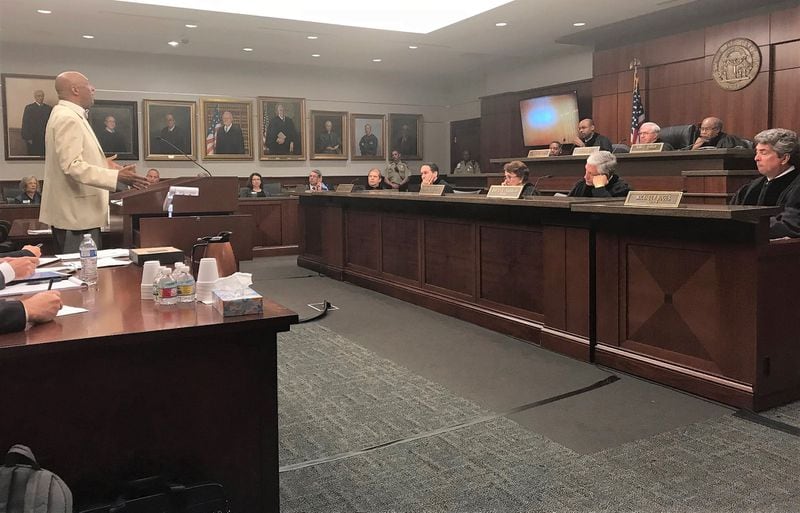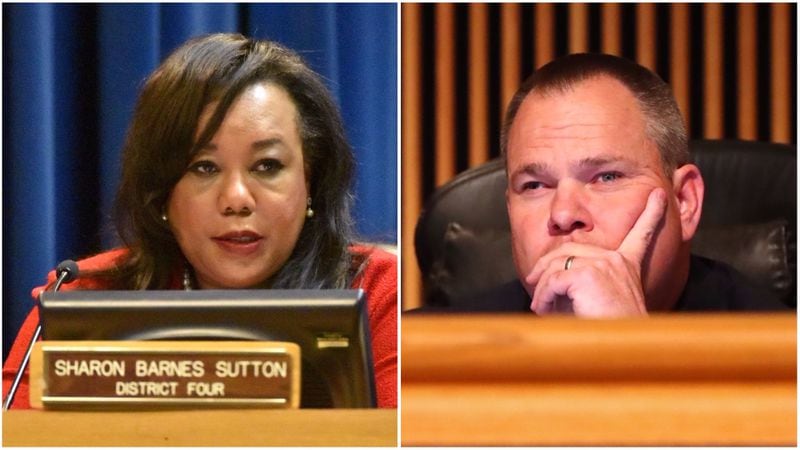Officials throughout metro Atlanta and the state are scrambling to reassess the way their cities and counties handle the oversight of public officials and government employees after a recent Georgia Supreme Court ruling.
The state's high court issued its far-reaching opinion last week, siding with a previous target of DeKalb County's ethics board, who had taken issue with the use of board members appointed by private groups. Those appointed by organizations like DeKalb's Bar Association and Chamber of Commerce have no direct accountability to the public, which is required by the state constitution, the court ruled.
Many other jurisdictions in the state use similar processes to form their own ethics boards.
Carla Miller, the founder of Jacksonville, Fla.-based nonprofit City Ethics, said the new high court opinion was "not shocking" in a legal sense. But places like DeKalb, Atlanta, Fulton County, Cobb County, Clayton County and Gwinnett County now have to figure out just how problematic their ethics board arrangements may be — and how to make the proper adjustments without jeopardizing oversight efforts.
It’s unclear if the ruling directly affects past decisions made by boards appointed using the legally flawed process, though legal challenges by those investigated by such boards are certainly possible. At least one such lawsuit is currently being litigated in Gwinnett.
“It has a broad and far-reaching impact,” said Robert Tatum, the chairman of DeKalb’s ethics board.
‘Not authorized to wield the power’
In his Aug. 27 opinion against the DeKalb County ethics board, Justice Harold D. Melton left little room for interpretation.
Each of the people appointed to the board were given the authority to "wield government power," he wrote in the unanimous opinion — but the groups making the appointments don't have the authority to give that power.
Organizations like the bar association, the chamber, Leadership DeKalb and even major local universities shouldn’t be permitted to make appointments without an elected official signing off, according to the court.
“As these private entities do not answer to the people as required by our Constitution,” Melton wrote, “they are not authorized to wield the power to appoint public officials to the DeKalb County Board of Ethics.”
DeKalb is still trying to figure out next steps, but may lean on the General Assembly.
“It’s not about the process itself or the organization itself,” Tatum said. “It’s about how members are appointed. So the Legislature needs to address that.”
Metro Atlanta jurisdictions are structure slightly differently from each other, but most allow non-elected entities to at least suggest who should serve.
Some jurisdictions are planning tweaks. Though it may not be all that simple.
The Cobb County ethics board is currently comprised of members appointed by outside groups like homeowners associations and the local bar association. J. Lynn Rainey, the Board of Ethics’ attorney, said he forwarded the Supreme Court opinion to Cobb’s county attorney on the day it was published, suggesting the county’s rules needed to be changed.
But there’s also gray area. A few of Cobb’s seven ethics board seats are appointed by groups like the Civil Service Board and the Board of Elections, which are groups run by the government but their members aren’t elected.
“All of the governmental entities have their authority from elected officials,” Rainey said, “but is that sufficient?”
In Clayton County, Commission Chairman Jeff Turner said outside groups appoint four of the ethics board’s seven members. He admitted the current structure isn’t in compliance with the new ruling but said he wasn’t sure when things might be changed.
“I don’t know if we’ll do that now or wait”until after a new county commissioner is seated in January, Turner said. “It would be my preference to wait to the first of the year … because that new incoming commissioner should be able to weigh in.”
‘Totally different’
Not every jurisdiction believes it has to change how it’s operating.
Atlanta’s ethics officer said the ruling is being reviewed, but the city might not be affected. Outside groups recommend members to the ethics board, but the mayor appoints them and the City Council also signs off. A similar process involving commissioners approving ethics board appointments is in place in Fulton County.
In Gwinnett County — where Commissioner Tommy Hunter is still challenging his 2017 ethics reprimand in court — Commission Chairman Charlotte Nash drew a line between her county and DeKalb. She said the ethics boards are “totally different.”
Gwinnett does use non-elected bodies, like the local bar association and the Association of County Commissioners of Georgia, to appoint two of its five ethics board members. Guidelines also call for the subject of an ethics complaint (which could be filed against any county employee) to appoint his or her own member to the board, which is not a standing body and only assembled when a complaint is filed.
But Nash believes Gwinnett’s methodology is legal because the ethics board is merely a recommending body and doesn’t have any actual power to hand down punishment. The county commission ultimately does that, and it does not have to act in accordance with recommendations made by the ethics board.
In DeKalb, where former Commissioner Sharon Barnes Sutton filed the suit that led to the court’s decision, the Ethics Board conducts investigations and renders decisions independently.
“I believe this difference still provides a basis for distinguishing between the DeKalb situation and ours,” Nash said.
The Georgia Supreme Court may have the final say on that. And it may have it relatively soon.
Hunter — the commissioner who was reprimanded after 2017 Facebook posts that, among other things, called civil rights leader and U.S. Rep. John Lewis a "racist pig" — subsequently filed a lawsuit to challenge the constitutionality of the ethics board that recommended his punishment. That litigation is still ongoing.
The original ruling in the suit sided with the county. Last month, Gwinnett Superior Court Judge Randy Rich dismissed the latest appeal from Hunter's legal team.
Dwight Thomas, who was the victorious attorney in the DeKalb County ethics board case, is representing Hunter in Gwinnett. He said he plans to file a new appeal with the state’s highest court.
“The [DeKalb] decision will have statewide impact on boards and commissions,” Thomas said, “and will have positive impact on Hunter v. Gwinnett County.”
— Staff writer Leon Stafford contributed to this story.
THE STORY SO FAR
- November 2015: About 92 percent of DeKalb County voters approve restructuring the Board of Ethics, allowing four members to be appointed by outside groups like local universities and the DeKalb Bar Association. Facing an Ethics Board investigation, Commissioner Sharon Barnes Sutton files suit accusing the board of being unconstitutional.
- April 2017: Superior Court Judge Asha Jackson rules that it is unconstitutional for Ethics Board members to be appointed by outside groups.The board appeals.
- August 2018: The Georgia Supreme Court issues an opinion upholding the lower court ruling. Surrounding jurisdictions begin to assess the impact on their own ethics boards.










